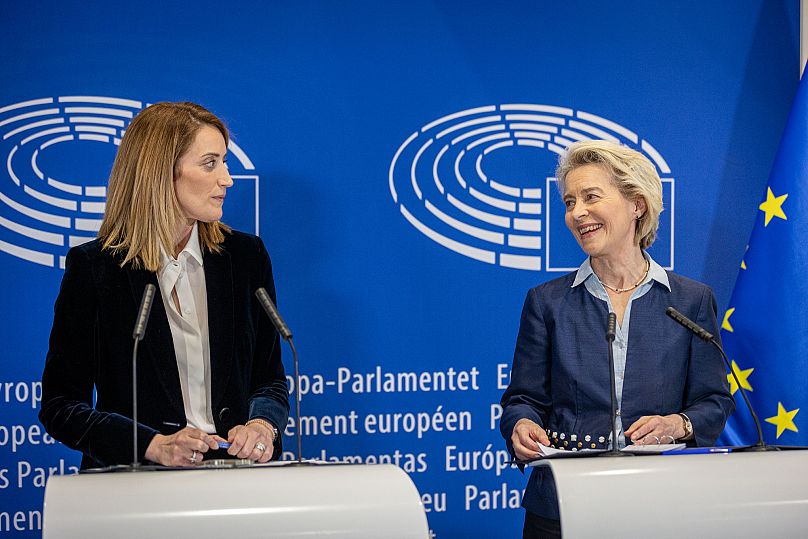Unggulan
- Dapatkan link
- X
- Aplikasi Lainnya
EU Sees Record-High Citizen Approval Amid Geopolitical Tensions
The latest Eurobarometer gauge, carried out between January and early February 2025 across all EU member states, showed growing appreciation for the EU, particularly in the current geopolitical climate.
About 74% of the respondents indicated that their nation gains advantages from being part of the European Union, which represents the highest approval rate since this query was initially posed back in 1983.
The Eurobarometer survey is carried out periodically for the benefit of the European Parliament, offering an overview of public sentiment.
The European Commission President, Ursula von der Leyen, expressed her approval via Twitter, highlighting that peace and security are foremost concerns. She emphasized that the EU administration is dedicated to fulfilling commitments in these areas.
The survey indicates that 90% of participants think that EU countries should show more solidarity when tackling worldwide issues. This underscores an increasing recognition of the EU’s role on the global stage, as noted in earlier Eurobarometer reports.
Another key finding is that 76% of respondents believe the EU needs greater resources to effectively address future challenges. This comes at a crucial moment as negotiations on the EU’s long-term budget approach.
The European Parliament is currently working on its budgetary priorities and will present a report for a vote in the upcoming plenary session in May 2025 while the Commission is expected to put forward its proposal after Summer.
A generally favorable perception of the European Union
Public perception of the EU has continued to improve, with 50% of respondents holding a positive view - two percentage points higher than in spring 2024 and five points higher than in autumn 2023.
Similar to earlier polls, 72% of Europeans believe that EU policies affect their everyday activities, a statistic that has remained constant since mid-2024. Opinions about the advantages of being part of the European Union differ across countries, with support levels spanning from 92% in Malta to 61% in Bulgaria. Nonetheless, every member state still maintains significant backing.
Young people (aged 15 to 24) are more convinced of the EU’s benefits, with 82% - an increase of 11 points - believing their country gains from membership.
When questioned about the advantages of joining the European Union, participants indicated that safeguarding peace and enhancing security were their primary concerns, surpassing the former lead reason of better collaboration among member countries.
Other key benefits include economic growth, new job opportunities, and a stronger global presence for European citizens.
Safety and economics as top concerns...
The change in public priorities is evident: currently, 35% view safeguarding peace and enhancing security as the primary advantage of EU membership, which represents a three-point rise from the previous summer.
Enhanced collaboration among European Union nations, previously the leading factor, has decreased by two percentage points to 34%.
Two-thirds of Europeans desire a more significant role for the EU in safeguarding them. This is an unmistakable demand for action, and we shall address it," stated European Parliament President Roberta Metsola in response to the findings. "To make our citizens feel more secure, Europe must become more robust.
She emphasized that Parliament will make sure all suggestions meet the necessary standards to tackle Europe’s security issues effectively.
The survey indicates that 36% of Europeans consider defense and security as the primary focus needed for enhancing the EU's standing globally.
Competition, economic expansion, and industrial progress have closely followed suit, increasing their score by five percentage points over the last year to stand at 32%.

...with some national differences
While defence and economic competitiveness dominate as the top concerns in most countries, member states prioritise different issues.
In Spain, the top priorities for the EU include focusing on education and research. Similarly, Cyprus and Malta stress the importance of education. In contrast, Sweden prioritizes EU values like democracy and human rights, with climate action being almost equally significant.
In Slovakia and Croatia, food security and agriculture continue to be top concerns. Meanwhile, in nations such as Denmark, Germany, and Lithuania, defense emerges as the predominant challenge.
At the same time, in Bulgaria and Italy, competitiveness stands as a primary worry, closely trailed by the issue of achieving energy autonomy.
Concerns about society and the expense of daily life
Apart from security concerns, Europeans are growing more troubled by various matters such as poverty, social exclusion, and employment generation.
"This survey conveys a strong and unified message: security and economic competitiveness are interconnected and mutually dependent," stated an official from the European Parliament.
Concerns about the economy are escalating, as 33% of Europeans anticipate their quality of life will deteriorate over the coming five years—a rise of seven percentage points from the previous European elections, reverting to figures observed in early 2024.
This sentiment is notably intense in France (53%, an increase of eight percentage points) and Germany (47%, rising by fifteen percentage points).
At the same time, 43% of those surveyed call for the European Parliament to make addressing inflation, increasing costs, and the cost of living their top priority. Coming in second place, defence and security, together with combating poverty and social exclusion, are emphasized by 31% of respondents.
Even with these worries, most Europeans (51%) anticipate no alteration in their quality of life, whereas 14% think it will get better.
The survey further reveals that older Europeans, people residing in rural regions or small towns, and those who are already struggling economically are the ones most prone to expect a decrease in their standard of living.
- Dapatkan link
- X
- Aplikasi Lainnya
Postingan Populer
Unmasking Misinformation: Journalist’s Quest for Verified Truth (International Edition)
- Dapatkan link
- X
- Aplikasi Lainnya
Zimbabwe Debuts World’s First Article 6 Carbon Registry: A Global Pioneering Move!
- Dapatkan link
- X
- Aplikasi Lainnya
Komentar
Posting Komentar